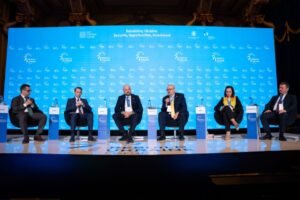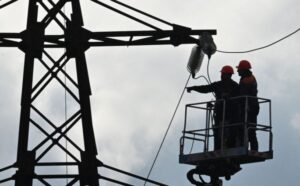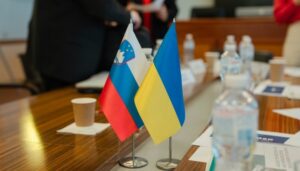
The state-owned enterprise Lisy Ukrainy plans to implement more than 60 projects for the construction and reconstruction of forest roads with a total length of more than 200 km in 2026, the company’s press service reported.
“Only paved roads can ensure stable production in any season. Our investment plan is aimed at ensuring energy independence and uninterrupted timber supplies, especially during the spring mud season, which usually paralyzes traffic on dirt roads,” the state-owned enterprise wrote on its Facebook page.
According to the plan, the largest number of facilities are planned in the Carpathian (19), Polissya (15), and Capital (11) forest offices. New construction is also planned in the Northern, Podolsk, and Central regions. The projects involve the creation of roadways and the construction of intermediate warehouses for the storage, sorting, and shipment of forest products.
As an example of the economic effect, the company cited the Ozernyansky Forestry (Ivano-Frankivsk region), where, thanks to the new road, the annual harvest will increase from 15,000 cubic meters to 17,000 cubic meters. In the Zhubrovitsa Forestry (Zhytomyr region), construction will allow 1,000 hectares of the Forest Fund, which were previously only accessible during periods of frost or drought, to be used for economic activities.
In addition to production indicators, the projects have social significance. In particular, in the Lyuboml district of Volyn, a new road between the villages of Borove and Sokol will shorten the route for local residents by 15 km, which will significantly facilitate logistics and access to firewood.
CONSTRUCTION, forest roads, Forests of Ukraine, RECONSTRUCTION

Participants in the Green Reconstruction and Green Energy panel at the Rebuilding Ukraine: Security, Opportunities, Investments forum in the Romanian capital concluded that the modernization and decarbonization of Ukraine’s energy infrastructure must go hand in hand with digitalization, the development of smart cities, and deeper integration into the EU energy space.
The panel was moderated by Corneliu Bodea, president of the Romanian Energy Center, who outlined the need for profound transformations of energy systems to transition to a low-carbon model. The key speaker was Bogdan-Gruia Ivan, Romania’s Minister of Energy, who set the strategic guidelines for the discussion. The discussion was also joined by George Agafitei, Head of Sustainable Development and Institutional Relations at PPC Group; Vitaly Radchenko, Head of Energy and Climate Change Practice at CMS Ukraine; Nicolas Richard, CEO of Engie Romania; Gheorghe Chubotar, President of Electroalfa International; and Eduard Dumitrascu, President of the Romanian Smart City Association.
The speakers noted that urban digitalization and energy modernization projects, in particular smart city initiatives, have become important catalysts for the renewal of local energy systems and municipal infrastructure. They emphasized that Ukraine should not be underestimated in terms of technological solutions: businesses and government agencies are highly receptive to the implementation of digital tools, from artificial intelligence to network infrastructure optimization. “Ukraine has already demonstrated its ability to quickly transition to new digital platforms. This makes it possible to build a modern energy sector rather than a ‘patched-up’ one,” Radchenko noted.
Participants emphasized that Ukraine is undergoing an intensive phase of legislative reforms and convergence with European standards in the fields of energy, ecology, and market regulation. This creates conditions for more effective coordination between central authorities and local levels, as well as for the implementation of joint projects with EU countries, with an emphasis on inter-state interconnectors, network balancing, and strengthening regional energy security. “Aligning rules with European ones is not only a requirement for integration, but also a prerequisite for attracting investors to long-term ‘green’ projects,” Ivan emphasized.
A separate part of the discussion was devoted to rethinking the architecture of energy networks in the direction of decentralization, flexibility, and increasing opportunities for electricity flows between countries. Participants recalled that Ukraine is already working in sync with the European energy system and is increasing the volume of electricity and gas exchanges with EU countries. In their opinion, Ukraine’s “green” transformation requires not only the physical reconstruction of generation and network assets, but also the formation of a new culture of innovation capable of attracting strategic investments and the most advanced technologies.
In this context, cooperation between European and Ukrainian energy and technology ecosystems was described as a fundamental element of regional energy sustainability. Participants called green reconstruction a historic opportunity to form a more sustainable, digitized, and EU-integrated Ukrainian economy. The panel concluded that, despite the challenges, close cooperation and coordinated investment by the state, business, and international partners is the only realistic path to an effective, future-oriented reconstruction of the energy sector.
The forum “Rebuilding Ukraine: Security, Opportunities, Investments” is being held on December 11-12 in Bucharest under the auspices of the Romanian Ministry of Foreign Affairs and the Ukrainian Ministry of Foreign Affairs and is organized by the New Strategy Center. According to the organizers, more than 30 panel discussions and parallel sessions are planned over two days with the participation of representatives of governments, international organizations, the private sector, financial institutions, and experts from Europe, North America, and Asia. The topics of the panels cover security and defense, infrastructure, financing and investment, green energy, digitalization, human capital, and cross-border cooperation.
DIGITALIZATION, energy market, EU, INTEGRATION, RECONSTRUCTION

At the Rebuilding Ukraine: Security, Opportunities, Investments forum in Bucharest, during one of the panel discussions, representatives of Romania, the Republic of Moldova, and Ukraine announced their intention to deepen regional cooperation in infrastructure within the “strategic transport triangle” to support Ukraine’s reconstruction and strengthen the region’s resilience.
The panel was moderated by George Scutaru, CEO of the New Strategy Center think tank. Participants included Vladimir Bolea, Deputy Prime Minister and Minister of Infrastructure and Regional Development of the Republic of Moldova; Mihai Iurca, Special Envoy for the Reconstruction of Ukraine and Head of the Office of the Prime Minister of Romania; First Deputy Chair of the Verkhovna Rada Committee on Transport and Infrastructure Yulia Sirko, State Secretary of the Ministry of Infrastructure of Romania Ionel Scrieşteanu, Deputy Minister of Communities, Territories and Infrastructure of Ukraine Serhiy Derkach (via videoconference), and CEO of Leviatan Group Cătălin Podaru.
The discussion focused on the strategic importance of regionalizing infrastructure projects between the three countries and developing logistics corridors that ensure not only economic and demographic mobility, but also military mobility in the context of the ongoing war. The participants emphasized that transport and energy connectivity is seen as a tool for coordinating government policies, as well as a platform for involving the private sector in the reconstruction of Ukraine.
“Logistics is becoming a key element of security and development: from ports and railways to border infrastructure, all of this must function as a single network between Romania, Moldova, and Ukraine,” Skutaru noted during the discussion. He stressed that coordinating investments and projects within the “strategic transport triangle” is a necessary condition for increasing the capacity of corridors used for trade, transit, and military aid.
Representatives of the Ukrainian and Moldovan sides stressed that the reconstruction of Ukraine is impossible without the active participation of private business and the involvement of international companies in joint projects. “Ukraine is open to partnership, and we need both financial resources and technological solutions that can be provided by regional and global partners. Joint infrastructure projects strengthen not only the economy but also the stability of the entire region,” emphasized Deputy Minister Serhiy Derkach.
Following the discussion, participants noted positive dynamics in strengthening connectivity between the three countries, particularly with regard to the modernization of transport corridors, port, and border infrastructure. They concluded that further progress will depend on coordinated government action, effective use of financial instruments, and close cooperation with international partners to enhance the collective resilience and prosperity of the region.
The forum “Rebuilding Ukraine: Security, Opportunities, Investments” is being held on December 11-12 in Bucharest under the auspices of the Romanian Ministry of Foreign Affairs and the Ukrainian Ministry of Foreign Affairs and organized by the New Strategy Center. According to the organizers, more than 30 panel discussions and parallel sessions are planned over two days with the participation of representatives of governments, international organizations, the private sector, financial institutions, and experts from Europe, North America, and Asia. The topics of the panels cover security and defense, infrastructure, financing and investment, green energy, digitalization, human capital, and cross-border cooperation.

The European Bank for Reconstruction and Development (EBRD) plans to provide NEC Ukrenergo with a state-guaranteed loan of up to EUR90 million for the reconstruction of selected substations in the country.
“It is expected that the loan, if possible, will be co-financed by investment grants from international donors totaling up to EUR60 million for the purchase of reserve stocks of electrical equipment and equipment for inter-system connections,” the bank said in a statement on its website.
The project is currently awaiting approval by the bank’s board.
As explained by the EBRD, the goal of the project, with a total cost of EUR 150 million (EUR 90 million + EUR 60 million), is to increase the resilience of the power transmission system in the face of constant attacks to ensure uninterrupted power supply to the population and businesses throughout the country.
In particular, the current loan will be used to reconstruct three existing substations and complete the construction of one new substation in Ukraine, which was started as part of a project financed by the bank in 2014.
The reconstruction of the three existing substations and the completion of the new substation will be carried out in accordance with international best practice, using equipment that meets EU requirements. Some of the damaged or destroyed equipment will be replaced.
Currently, the new substation with 330 kV overhead power lines is being built at the stage of already laid foundations using EBRD loan funds saved as part of the project to build the 750 kV Zaporizhzhya NPP – Kakhovka power line.
As the EBRD recalled, since February 2022, the bank has provided Ukrenergo with three loans as part of its ongoing support, including emergency capital support and emergency investments aimed at restoring the power transmission network after serious damage caused by the Russian military invasion of Ukraine.
According to the EBRD, Ukrenergo has provided the bank with satisfactory reporting on these loans, as well as generally satisfactory reporting in the past. It has the national capacity to implement the bank’s environmental and social requirements (ESR), as well as national and European legislation. The company is strengthening its ESG management system, including inclusive measures, to help it report on sustainability issues in the future in accordance with the EU Corporate Sustainability Reporting Directive (CSRD).
As reported with reference to Maxim Khlapuk, a member of the Verkhovna Rada’s energy committee, as of June 2025, the total amount of credit funds under agreements between Ukrenergo and the EBRD, as well as the European Investment Bank (EIB), amounted to EUR1.22 billion, of which EUR 215.5 million remained unutilized, and with the International Bank for Reconstruction and Development (IBRD) – $509.74 million, of which $54.87 million remained unutilized.
In addition, under two grant agreements between Ukraine and the IBRD for EUR 37.7 million and $200 million, EUR 18.9 million and $134.5 million remained unutilized, respectively.
EBRD, LOAN, POWER GRID, RECONSTRUCTION, SUBSTATION, UKRENERGO

Deputy Prime Minister for Recovery of Ukraine, Minister of Community and Territorial Development Oleksii Kuleba has agreed with Slovenian Finance Minister Klemen Boštjančič on a number of new projects to rebuild frontline regions.
“We have agreed on new projects in the areas of water supply, energy efficiency, and municipal infrastructure for frontline regions,” Kuleba wrote on Telegram on Saturday.
The deputy prime minister noted that they also discussed developing cooperation in rebuilding and supporting communities, attracting Slovenian businesses to Ukrainian projects, and strengthening technical cooperation between institutions in both countries.

The Kyiv School of Economics (KSE) plans to invest $10 million in the internal renovation of the Golf Club in Obolon, Kyiv, which it recently acquired for $18 million, so that the campus created on its premises meets the requirements of leading world universities, KSE President Timofey Milovanov said.
“About $10 million will go toward internal renovation, not external. Everything there needs to be demolished, and laboratories, amphitheaters, and makerspaces need to be built. … Filling the campus itself with high-quality, modern educational facilities, such as those found in top universities, will cost $10 million,” he said in an interview with Interfax-Ukraine.
According to Milovanov, KSE sent a team to MIT (Massachusetts Institute of Technology) to see what a makerspace is.
“This is where students have access to all modern robots, lasers, machine tools with software control — everything they need to make a prototype if they have an idea. All the equipment must be there, from projectors to lecture halls, and there must be access to software that costs money even for universities,” explained the KSE president.
He added that there are plans to open these makerspaces for students from other universities as well.
Milovanov recalled that the first KSE building in Kyiv, located at 3 Shpaka Street, cost $2.5 million, with another $2.5 million spent on renovations: shelter, sleeping capsules, library shelves, AI cameras that allow hybrid lectures, a security system, fire safety, modern ventilation, batteries, and generators in case of blackouts.
Some of this is already in place at the Golf Club, but it was designed for a small number of people, not the several thousand students who will be working here, added the KSE president. Among other things, he pointed to the building’s well-insulated basements, which can be used as shelters for all students and teachers.
He emphasized that he was very pleased with the purchase because the Golf Club was built to a very high standard, so the price of the deal was very attractive considering the location—$18 million for 14,500 square meters of space plus 5 hectares of land on lease.
“Even if you don’t count the land and the location near the Dnieper, that’s $1,200 per square meter! (…) But now there are no buyers. If people have $20 million, they will buy a hotel in Indonesia, not invest in Ukraine. I think this is simply a factor of the war, and we are very lucky—without the war, it would have been many times more expensive,” Milovanov believes.
According to him, in theory, the first students could use the renovated building as early as January next year, although in practice it may take longer, partly because of the existing tenants, with whom KSE would like to resolve the issue without any disputes.
“But there are two buildings at the Golf Club. One of them is empty—there are no tenants. So we are already starting demolition this week, and it may be ready sooner. That is where we will build makerspaces, amphitheaters, and other significant renovations,” said the KSE president.
He emphasized that the university will maintain the land’s sporting purpose, as stipulated in the lease agreement.
“We will do everything completely according to the law, so we will leave the golf course. Some good businessmen are already writing to us about how this can be improved. So maybe there is something in this direction,” Milovanov said.
At the same time, he said that in the future, KSE would like to expand the purpose of the land plot so that it fully corresponds to the university, so it will submit all the documents to the Kyiv City Council.
“I think it will take 5-7 years. But we have no other way, because we are an American company. Although local developers tell me: Timofey, why are you doing this? Do what you have to do, and you’ll figure it out later. But we don’t do that, we are an American company. We don’t know how to decide things like that,” he emphasized.
KSE is a private university and research center founded in 1996. It operates as a non-profit organization registered in the United States. Since 2022, KSE donors have contributed more than $150 million to humanitarian, defense, and educational projects, including the development of university infrastructure.
GOLF CLUB, INVESTMENT, KYIV SCHOOL OF ECONOMICS, RECONSTRUCTION